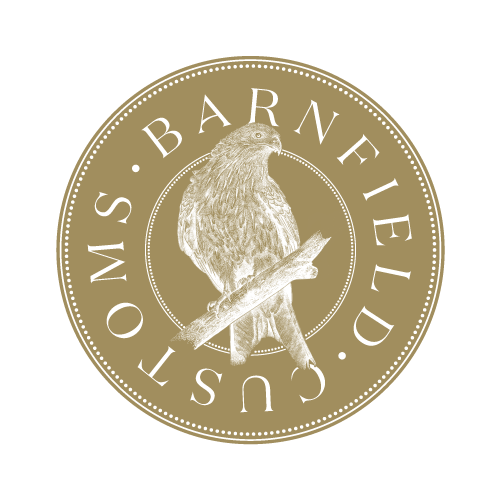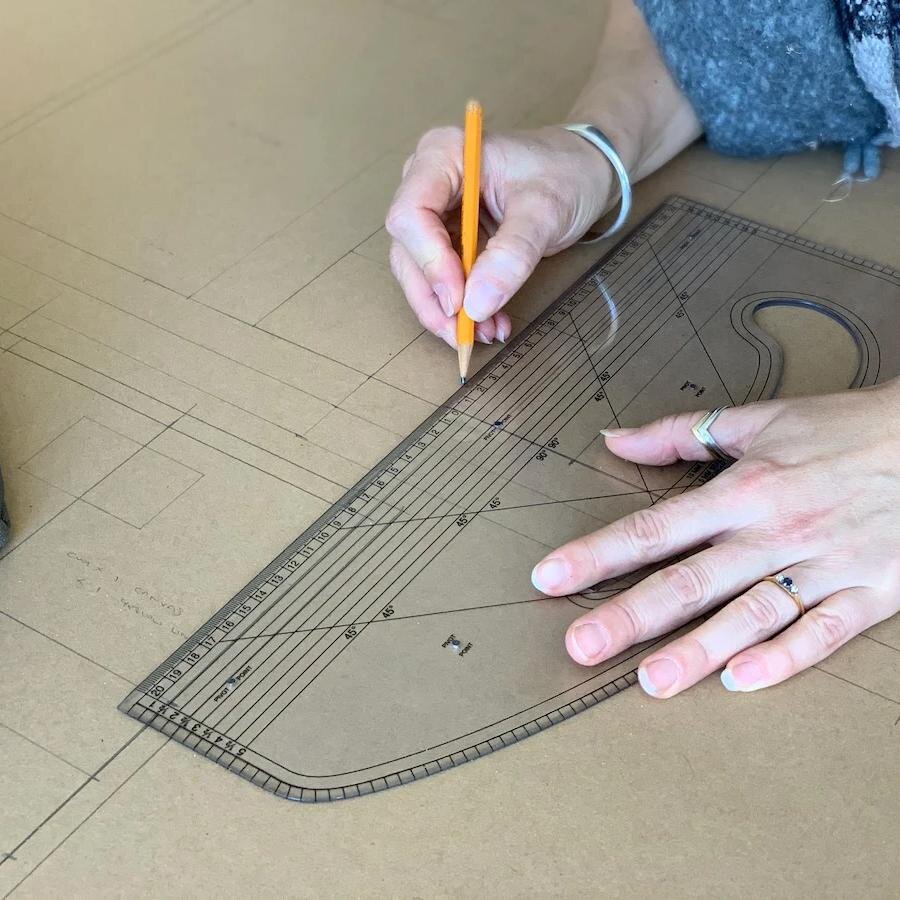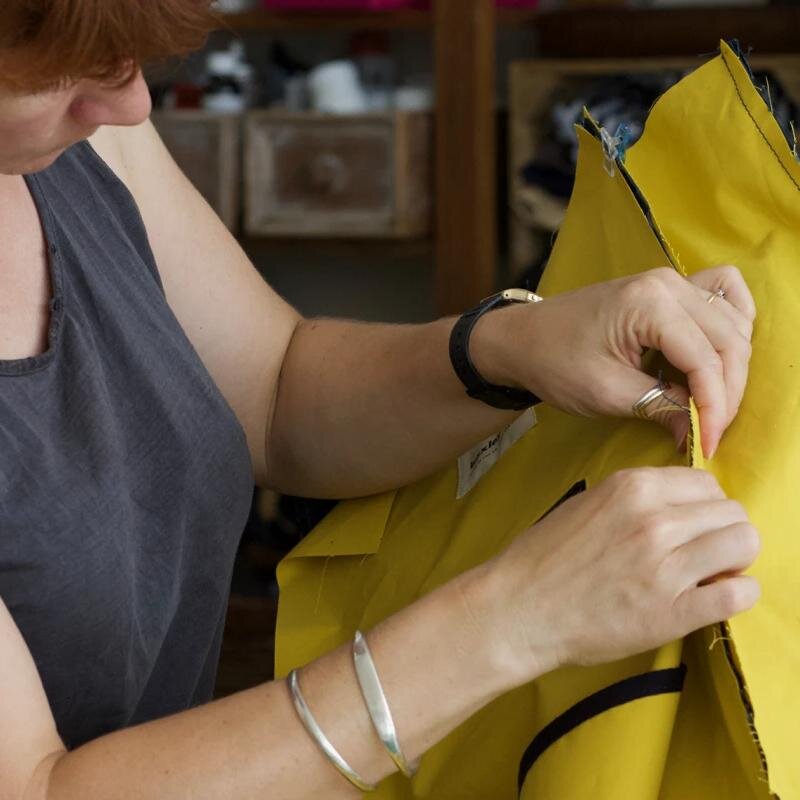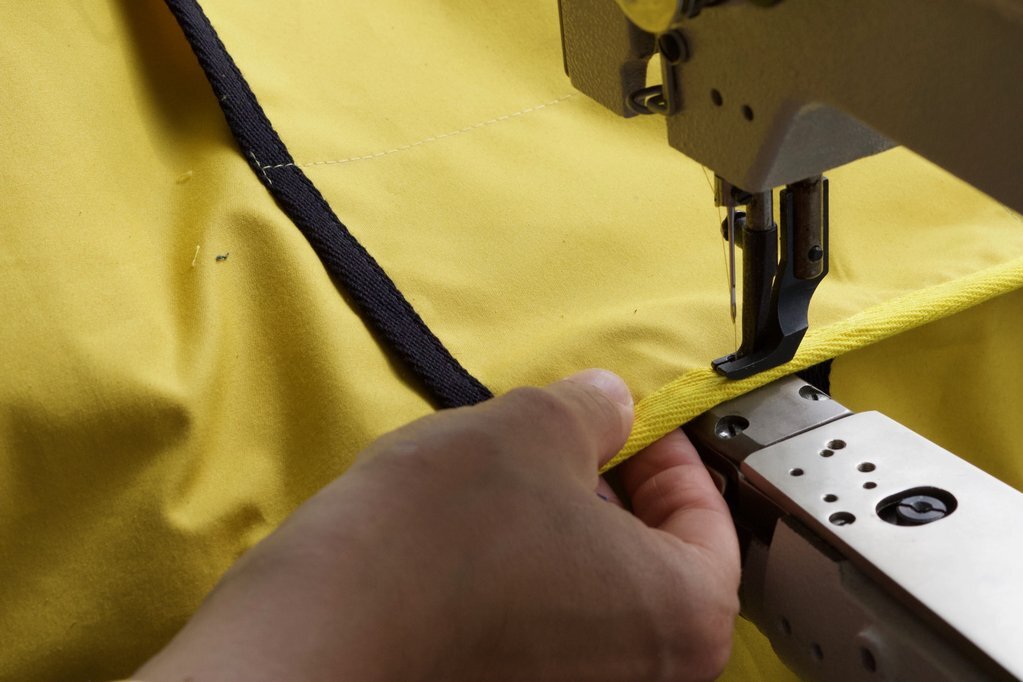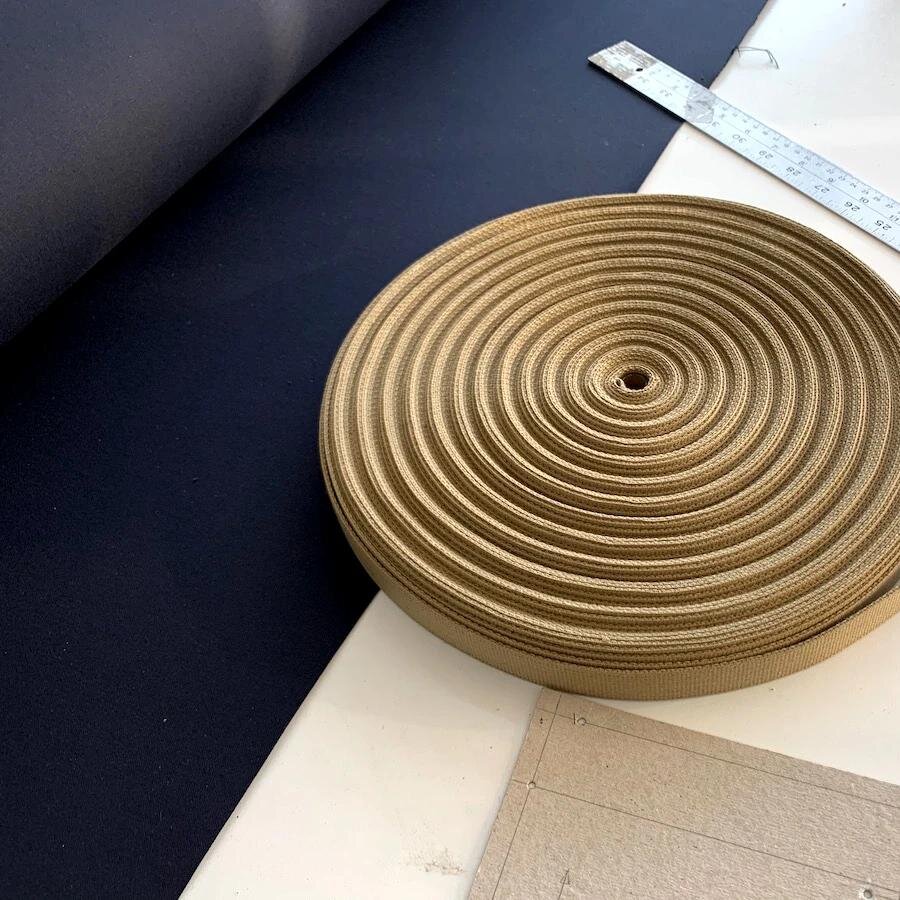Lyndsay Lucero
Lyndsay’s story starts in London as a design graduate. Part two sees her setting up on her own and landing clients like the Hummingbird Bakery before working for Apple. Part three and, as a Mum of two, she’s crafting bags at Baxley Goods for a world that needs us to care.
Where do you live/are you from?
So right now I live in Hove. I’m a 10 minute walk from the beach and 10 minute run to the downs. Actually, I'll be moving further East to the South Downs real soon but I’m originally from the United States. I moved over 16 years ago after graduating University. I was looking for a bit of an adventure and I just kind of got stuck in a wonderful way.
What were you doing before Baxley? And what made you take the leap?
I have a really close friend who lived over here in London, and I’d come and visit her often during University. I just really, really enjoyed it over here. One of the times I was visiting, I was in Camden Market and I heard someone with a North American accent. I was like, how are you here? How are you working? And he told me about this particular visa that allowed a student or a recent graduate to come and stay for longer periods of time. So I flew home to apply for that, waited a few months for it to come through and came back for six months and ended up extending for another six months. I was working in a bakery at the time selling cupcakes and desperately trying to find a permanent job which I ultimately did in the very last week of the extension.
I landed a job at a fantastic branding agency and worked there for two and a half years. There were five or six of us at most with a few other consultants but we got to work on some really big projects. We did a bunch over in Dubai for a little while and because I was the youngest staff member and I hadn’t specialised yet, it was great. I was able to be part of each process and I learnt so much. I’d been teaching myself whatever I could around digital - web design, information architecture and that sort of thing. So by default, I was the digital person and was suddenly restructuring massive websites. That was a really exciting time.
But then we hit the 2008 financial crash. We were working for a lot of property companies and banks and the crash took all that out from underneath us. I’d always wanted to do something myself but as someone who was dependent on a visa it was kind of tricky. I’d always ask myself “Can I go out and be a freelancer? Am I even allowed to do that?” There were always a lot of unknowns. But the company folded and amazingly, I’d just got engaged the month beforehand. Although he's American too, he had a British passport and so when we married, that allowed me to stay in the country.
I started my own digital agency and ran that for 10 or 12 years. The Hummingbird Bakery was our first client and we built their first ecommerce site. That gave us traction and we picked up some work in Russia in the food and beverage sector and then I got a few contracts through Apple, which had me working with them exclusively for a few years. That was a bit of a tricky one, because it was all under NDA so I wasn't able to advertise or even mention that we were working for this major company. But it was an amazing experience, at an incredible time where their budgets matched the creativity that you offered. It was really exciting work.
But I was beginning to get pretty burned out. Some of the projects up in Russia were really very tricky to manage and so I was looking for other opportunities and saw that Apple had some roles available. So I applied, but when the job interview came through, it was for a video production designer. I was like “Oh my god, I know absolutely nothing about video. I mean, it sounds cool though. I would love to be someone who creates video but that's not my world!” But at the same time I thought, this is my chance. This is my opportunity with Apple.
So I created a video that weekend. I was able to pull together this pretty cool video that at least I was very proud of and proud enough to show at the interview. I was just totally honest and was like “Hey, I didn’t realise that this was what the role was going to be, and I know nothing about digital video design. But I've taught myself this over the weekend. This is what I'm able to do basically, in a matter of 48 hours.”
They had a lot of fun watching it and I was able to showcase my work in general. And so they said “Okay, well you aren't perhaps right for this role but we’re excited about working with you and what you could offer us.” At that point, although Apple were certainly established in England, they didn't have as much of a local presence as they do now. Still, design is mostly done over in Cupertino but they do have an outpost up in London. So I was able to be based here but report to the head of comms over in Cupertino and put my own team together.
A few years later, I had my first child and everything changed again.
Why bags? What drew you to them in particular?
I was working up until the final month on these big projects at Apple and in between then and having my second child, I did a bunch of smaller contracts. But all the work at Apple had been under NDA and so, to the world, I had this big gap. I realised that I was going to have to pretty much start from scratch. I had this amazing experience, I’d developed these amazing skills and I wanted to put them to use. But that meant big projects and big projects means big clients. Big clients means big cities.
So I started to look around but I also started to ask myself what I really wanted to drive towards. I'd done the design agency thing and I’d set up my own place. I'd seen the really exciting bits of that, and the exhausting bits too. And pursuing that more, building on top of what I’d already done and growing something bigger, I realised that wasn't something I really wanted. So I had this moment where I was asking myself what I wanted to be doing with my life.
“I decided to click on this bag and when I started looking at it I was like “Oh my gosh, I really kind of like this bag!” and that sent me down a rabbit hole.”
The environment has always been so, so important to me, since I was a child. And then, having my own kids at a time when Trump was coming into power in the States and Brexit was looming here, everything suddenly felt really uncertain. One of the positions I was looking at was at REI, which is an outdoor retailer in America. The position was for a Digital Director and they wanted to overhaul their website. I checked the site out to prepare for the interview and I specifically wanted to look at the user journey. I decided to click on this bag and when I started looking at it I was like “Oh my gosh, I really kind of like this bag!” and that totally sent me down a rabbit hole.
I was trying to choose which colour I might want to buy and I started to look a little closer. It looked a little beefy on the straps and maybe a bit too outdoorsy when, in my head, I wanted to be wearing this to hit design studios and coffee shops. Aesthetically, it just wasn’t quite right but I also couldn’t find anything else that came close. Functionally, it was a roll top design, which I loved but it didn't have the pockets that I actually needed. I couldn't see where I'd put my phone or my keys because the pockets were on the inside, not accessible from the outside and I had a lightbulb moment. This was something I could be doing. I wasn’t that excited about the job at REI where I’d have to move my entire family around the world back to America. But I’d really lit up about this bag, though.
I love bags, I've always loved bags. I realised that I knew nothing about bag construction or manufacturing, but I knew about complex user interface experiences. I didn't know anything about fashion, except that the industry wasn’t great for the environment. As a female in a very male dominated world of design, I felt like I’d been wearing bags that didn't really feel like they were designed for the needs that I had. All of a sudden, I was like “Oh my gosh, this is something that I can really, really get excited about.” So that's how Baxley began and pretty much right from there, I began to play around with putting a brand together.
Has the transition from one career to another been easy? Any major direction changes or bumps in the road? Did it go how you expected?
Almost the same week that I’d decided I’d found exactly what I wanted to do with my life, a design contract for a client fell in my lap. So distraction got in the way. I didn’t want to do it but I needed to make some more money, because I knew a project like this would require some self funding to begin with.
After that I started with branding, because that was what I knew the most. That's where my career began and so I was trying to define what the brand was but it’s tough at the beginning. So I started with a logo and then colour swatches and mood boards so that I could start to visualise the values and the personality that I wanted to be projecting. I think I built a website before I even had sketches of what the bag would look like.
I’ve always known that I want this to be a bigger brand beyond a single item, but I had to start somewhere. I think it was five months after that initial idea and I realised I hadn’t wavered in my desire to build Baxley. But I remember my parents coming over that Christmas and asking to see the prototypes I’d been working on. I'm not actually sure I even showed it to them because it was literally just white canvas with pins in it. It was so rudimentary and I knew that they wouldn’t be able to see what I could see. I just wasn't ready for those very delicate dreams to be crushed quite yet. That’s not to say that I thought my parents would be critical. It’s just that, at the early stage, everything is so fragile. You haven’t had the time to develop a strong foundation for your ideas to stand on.
I totally understand that you need to show the work before it's done. Showing the progress and putting yourself out there before whatever you’re working on is complete is perhaps the single most important lesson that I learned. And I don't feel I learned it too late, but I did wait until there was something that I could show that I felt was a viable MVP of what I want to be creating.
“I just wasn’t ready for those very delicate dreams to be crushed quite yet. ”
I don't think career transitions are ever easy, especially when you’re creating your own business. Having a clear end goal in mind, knowing where I’m going with this thing makes things a little bit easier. But that's not to say that it's not filled with doubt and fretting. For instance, I don't think I ever would have realised how long it would take, that it would be multiple years before I actually launched a product.
For me, figuring out what I wanted to do was the easiest part of the transition. I knew nothing about textiles, I didn't know anything about manufacturing, I didn't know anything about logistics and there were so many questions I didn't even know I needed to ask. But what I'm creating is using all the skills that I‘d spent so much of my career building over 15 years. Building websites taught me to be driven by what people do and what they need, using that to create something that is genuine, honest and responsible as possible.
For every bag or product that I sell, that's one that has been made in a way that’s considerate to nature and to the people who have made it. So I know that I'm giving my customers a better solution. And that's a very genuine motivation, that's a really, really strong base to give you more energy.
What lesson(s) have you learnt that you would tell other people who aren’t fulfilled doing what they’re doing?
Showing the progress and putting yourself out there before whatever it is that you’re making is complete is perhaps the single most important lesson that I learned.
“Showing the progress and putting yourself out there before whatever it is that you’re making is complete is perhaps the single most important lesson that I learned. ”
Do you think people are born to be entrepreneurs?
I think we all want to improve our lives. Even if you look at the day to day. Your socks probably aren’t in the bottom drawer of your dresser, they’ll be at the top. You're probably not putting your dishes far away from the dishwasher, you make sure that they're closer to the dishwasher, because that's easier. It’s not that I think we're all entrepreneurs working on the logistics of our household items. But we are all people trying to make our own lives easier. I feel like that’s ultimately what an entrepreneur is. They're trying to seek out those pain points and fix them, whether it’s initially just for themselves or whether there’s a larger audience. Whether or not someone turns those solutions into a business is another question. You need to have a belief that what you’re doing is worthwhile and that it will succeed right from when it’s just a seed of an idea and I think that is potentially something you’re born with.
For me, I'm very much a product of both my mother and my father. My mother constantly questions everything, not harshly, not critically or in a negative way. More like, whatever this thing is, how can it be made better? How can she learn more? And my father is the ultimate dreamer. He’s an entrepreneur, and he’s always had his own businesses and so throughout my entire childhood, I grew up seeing the ups and the downs really clearly. So I have the questioning of my mother, but the dreaming of my father.
Do you think people are born to create?
I would hope that we're all born to be creative. In all honesty, I might be too close to that one to answer without bias. My grandmother was an artist. And so every single time she came to visit, she brought pens and sketch pads and tools for us to be working with. So I grew up with creativity around me. My husband works for Apple but he's also first and foremost, a comic book Illustrator and so our kids are growing up in a super creative environment too. So I don’t have both sides of the argument to be able to make a call.
Tell us about a project you’ve worked on. Why does it stand out to you and what did you learn during the process?
I started writing an email newsletter, perhaps six months before I launched. And I did that because I had this idea like “Oh, I have a business, or I will at some point. And a business should have a newsletter.” So I started writing it because it's the one area where I'm incredibly comfortable speaking in first person and I was able to create it like a little weekly journal. Of all the many challenges I’ve faced, this was something that really went right. I was able to share everything and bring people along for the ride with me. There have been really hard periods and others where I’ve been so excited. For example, when I found a local manufacturer, that was super exciting but then the price was double what I was expecting. So suddenly you go from a high to, “This is no longer viable. How do I completely shift when a product I'm planning to sell for £100 is now going to be £260” Something like that was a fundamental shift in how I needed to be thinking about the brand and how it was positioned.
“This is no longer viable. How do I completely shift when a product I’m planning to sell for £100 is now going to be £260”
Writing this stuff out and having the purpose that the newsletter created, it made me realise that there’s a constant pivoting that needs to happen, especially in those early days. The lesson that I got from that was not just learning how to pivot, but how to use those moments of change positively. To always be looking for the positive and to be comfortable with sharing with the community that you’re developing.
It’s so important to create that community because it can act like a support network. It can start so tiny and you don’t have to share everything with the world immediately. But just talking about what you’re creating, obsessing over it and learning everything about it and showing that you’re doing it so that what you make is the best it can be. You get feedback and you can hear from more experienced people too but the best thing is having other people who share in your excitement and your story.
I made the first prototypes myself, which was a painful experience. But by speaking to a friend who recommended another friend and another friend, I found a local seamstress who was able to make the next four prototypes for me. She took a day and a half to make a prototype that had taken me three months. I only found her because I was sharing my experience with friends.
I was sharing in the newsletter and I was like “I don't know very much about pricing and sales is scaring the bejesus out of me. Can anyone out there in help?” and having people that I didn't even know write back to me was an amazing, amazing experience. And that only happened because I was asking for help along the way and sharing before I was completely ready.
Any other words of wisdom or anything else you’d like to share?
My first prototype took three months and almost immediately after finishing that, I started working on the second one because there were obvious things that needed to be improved. That took another three months and then the third one also took three months. So that was more or less a year in total. Then I had another four created by a local seamstress, another one after that by an innovation company, another by the first factory that I sampled out, and the second factory made two samples. All in, I think the first bag took 14 prototypes to get to including my very first canvas and pin versions. These things don't happen overnight.
And it comes back to identifying your motivation. You need to make sure that you have a clear purpose behind what you’re doing because it's not a fast track for many people. For anyone who's starting out, making sure that what you're about to embark on is something that has more than just a temporary fleeting love, that it hits some kind of greater purpose for you. Maybe it's not an Earth changing purpose but it has to be really, really worth giving up time with friends and family. That sacrifice, those evenings and weekends are really critical in bringing these projects to life.
